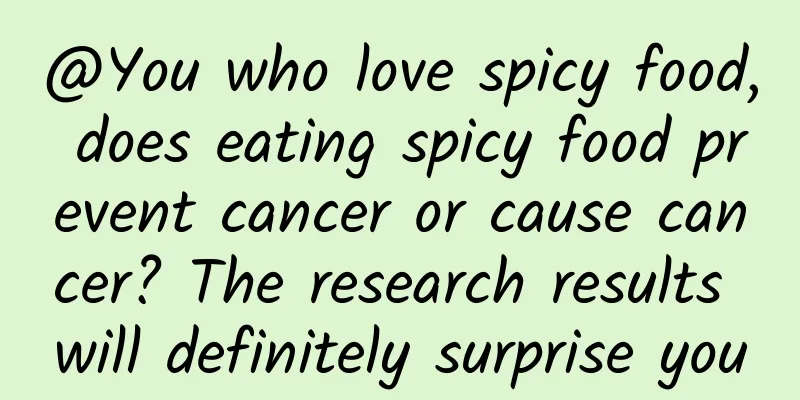@You who love spicy food, does eating spicy food prevent cancer or cause cancer? The research results will definitely surprise you

|
As a common condiment, chili pepper plays an important role in cuisines around the world. As scientific research continues to deepen, people have become very interested in the relationship between eating spicy food and health. Among them, one of the most hotly debated issues is: Does eating spicy food prevent cancer or cause cancer? A study involving 510,000 people in my country provides evidence. A study published in the International Journal of Epidemiology followed up 512,715 Chinese people aged 30 to 79 for 10 years and found that eating spicy food was negatively correlated with the risk of three types of cancer. Eating spicy food is indeed effective in reducing the risk of digestive tract tumors The study was conducted by a research team from Peking University and the University of Oxford in the UK. The participants' spicy food intake included fresh and dried peppers, chili oil, sauce, etc. The frequency of eating spicy food was divided into five groups: never eating spicy food, occasionally (once a month), 1-2 days a week, 3-5 days a week, and every day. The study found that the frequency of chili consumption was negatively correlated with the risk of gastrointestinal cancer. Specifically, compared with people who do not eat spicy food, people who eat spicy food occasionally, 1-2 days a week, 3-5 days a week, and every day have a 12%, 24%, 16%, and 19% lower risk of esophageal cancer, a 3%, 5%, 8%, and 11% lower risk of gastric cancer, and a 0%, 5%, 13%, and 10% lower risk of colorectal cancer, respectively. Further analysis found that the reduction in the risk of colorectal cancer is limited to rectal cancer. Compared with people who do not eat spicy food, people who eat spicy food every day have a 19% lower risk of esophageal cancer, an 11% lower risk of gastric cancer, and a 10% lower risk of rectal cancer. The following are the associations between the frequency of eating four types of spicy food and a lower risk of cancer. The type of spicy food and the intensity of the spiciness had little effect on these associations: In addition, when the researchers combined the analysis with smoking and drinking factors, they found that among non-drinkers and non-smokers, a high frequency of chili consumption was more significantly associated with a lower risk of gastrointestinal cancer. People who ate spicy food every day and never smoked had a 43% lower risk of esophageal cancer. People who ate spicy food every day and never drank alcohol had a lower risk of all three cancers, including a 27% lower risk of esophageal cancer. Besides being spicy, peppers have many benefits First, let's learn about peppers. The spicy taste of peppers is mainly because they contain a chemical called capsaicin, which is a natural alkaloid with a strong spicy taste. In addition to capsaicin, peppers also contain a variety of vitamins (such as vitamin C and vitamin A) and antioxidants such as carotenoids and flavonoids. These ingredients play an important biological role in the consumption of peppers. Capsaicin not only adds spiciness to peppers, but also has other benefits: it has multiple biological activities, including antioxidant, anti-inflammatory, antibacterial, and analgesic. Studies have shown that capsaicin can affect biological processes such as cell growth, differentiation, and apoptosis by activating or inhibiting multiple signaling pathways. In addition, antioxidant substances such as vitamin C and carotenoids in peppers also have a positive effect on scavenging free radicals and reducing oxidative stress. Chili peppers have an inhibitory effect on tumors However, eating too much spicy food can cause gastric mucosal damage Will eating spicy food cause cancer? This question has aroused the curiosity and concern of many people. Capsaicin in peppers is believed to have antioxidant, anti-inflammatory and anti-tumor potential. Some studies have shown that capsaicin can inhibit the growth, spread and angiogenesis of tumor cells by regulating multiple signaling pathways, thereby preventing the occurrence of cancer to a certain extent. In particular, experimental studies on some types of cancer, such as breast cancer and prostate cancer, have shown the inhibitory effect of capsaicin on tumor cells. However, there are divergent research results on whether chili peppers are directly carcinogenic. There are some studies that support the view that chili peppers can prevent cancer. However, it should be noted that high concentrations of capsaicin may irritate the gastric mucosa, and excessive consumption may cause gastrointestinal problems, affect food digestion and nutrient absorption, and may affect overall health; and may increase the risk of digestive system cancers such as gastric cancer. A study published in the Asia Pacific Journal Clinical Nutrition showed that high levels of chili pepper intake were positively correlated with the risk of gastric cancer. This means that excessive consumption of chili peppers may have a certain impact on stomach health. Scientific research on the relationship between chili peppers and cancer is still ongoing. Although some studies support the cancer prevention potential of chili peppers, the results are not consistent. Scientists are exploring the mechanisms of action of various components in chili peppers and how different types of cancer cells respond to chili peppers. These studies are helping to provide a more complete understanding of the link between chili peppers and cancer. Eat peppers appropriately to achieve a healthy life 1. Balanced diet. It is safe to eat peppers as a condiment in moderation. However, peppers are not the only food. A balanced intake of various foods can provide comprehensive nutrition. It is recommended to add vegetables, fruits, whole grains and other foods to the diet to maintain a balanced diet structure. 2. Individual differences. Individuals have different tolerances to chili peppers. Some people may be more easily stimulated by chili peppers, while others can adapt to the spiciness better. When eating chili peppers, you can adjust the amount of consumption appropriately according to your personal taste and physical condition. At present, there is no clear conclusion on whether eating chili peppers can prevent cancer or cause cancer. The active ingredients in chili peppers may have a positive effect on cancer prevention, but excessive consumption may bring some health risks. In general, a scientific and reasonable diet and a healthy lifestyle are the key to cancer prevention and treatment. Source: Chongqing University Cancer Hospital Author: Cao Haoyang, nutritionist at the Affiliated Cancer Hospital of Chongqing University and national registered nutritionist. Review expert: Yu Huiqing, Director of the Department of Geriatric Oncology/Nutrition, Affiliated Cancer Hospital of Chongqing University, Chief Physician, Master Supervisor Statement: Except for original content and special notes, some pictures are from the Internet. They are not for commercial purposes and are only used as popular science materials. The copyright belongs to the original authors. If there is any infringement, please contact us to delete them. |
Recommend
Rural people eat so much that they want to vomit, while city people want to eat but cannot buy it
Mud mustard greens is a wild forage grass that gr...
The efficacy and function of chicken claw black
I believe many people are familiar with the Chine...
After eating meat for so many years, you still can’t tell the difference between hot fresh meat, cold fresh meat and frozen meat?
In a blink of an eye, 2021 has entered its final ...
The efficacy and function of sea crab shell
There are so many medicinal herbs in the world, a...
The effect of drinking water with astragalus, red dates, wolfberry and longan
Red dates, longan, wolfberry and astragalus are a...
Beware! Changes in leg muscle blood vessels may be the earliest warning sign of heart failure
Compiled by: Gong Zixin Researchers at the Univer...
Treating constipation with raw white atractylodes
Raw Atractylodes macrocephala can be used as an a...
AI plays games better than humans? But what's the point of letting AI play games...
Welcome to Science Popularization China’s special...
Stop arguing! Should the Chinese zodiac sign be changed according to the Spring Festival or the Beginning of Spring? Finally there is an answer
As to when to change the zodiac sign, the " ...
What are the medicinal values of mint?
Many people have seen mint in daily life. The sme...
Effects and functions of costusroot
Traditional Chinese medicine requires the use of ...
People with weak spleen and stomach cannot hide their face! These 4 symptoms need to be treated in time
Mr. Zhang, 45 years old, has been feeling stomach...
Can Astragalus and Dendrobium be taken together?
In life, many people will stew soup to drink when...
Are tall people more likely to have lumbar disc herniation?
Rumor: "Tall people have a heavy burden on t...









